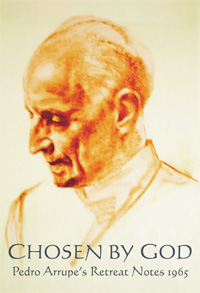
Price: £8.00
ISBN: 978 0 904717 29 7
|
THE
WAY a review of Christian spirituality |
To readers and friends of The Way, welcome to our new issue:
| Vol 49 no 2 |
Please click here to subscribe to The
Way,
here to order a single copy,
and here to order a free sample copy.
Subscribers may download the whole of this issue here . You will need your subscriber number; if you have requested an electronic subscription a reminder of this number will have been e-mailed to you. Otherwise please e-mail us to obtain your number.
Contents
Toni Witwer
The documents of the Second Vatican Council, especially those dealing with the nature of the Church and the renewal of religious life, related the idea of vocation to those special gifts (the technical term is charismata) which God gives to his people. In this it rediscovered an important strand of the Christian tradition. Toni Witwer relates this understanding to biblical representations of God’s call to individuals and groups and the various ways in which they respond to these calls.
J. Matthew Ashley
Ever since John Henry Newman, who will be beatified later this year, lectured on ‘The Idea of a University’ in 1854, the role of faith in tertiary education has been an important topic of discussion. J. Matthew Ashley presents ideas developed by one of the 1989 Jesuit martyrs in El Salvador, Ignacio Ellacuría, who was for more than a decade rector of the University of Central America. Ellacuría argued that the experience of spiritual consolation should be the touchstone for effective education at this level.
Download this article in PDF format by clicking here
Peter Steele
Peter Steele is an Australian poet and literary critic. In 2008 he published a sequence of poems entitled ‘A Mass for Anglesea’, which uses the structure of the Christian eucharist as a framework within which to consider the nature of religious experience. In this article he reflects particularly on one of these poems, ‘Offerings’, an evocative listing of many kinds of things for which it is worth giving thanks.
T. M.
The Focolare movement invites its members to help bring about a more united world by striving first to bring about unity within their own lives. In particular they are to allow their Christian faith to influence all aspects of their lives: work, leisure, family life, political outlook, as well as religious practice. Here, in our Spirituality and Living strand, a Focolare member who wishes only to be known as T. M. shows how this outlook has shaped his career in international banking.
Robert Doud
Philosophy can be seen as the attempt to make sense of the world around us using reason alone and, in particular, without the need for religious revelation. As such, to be a philosopher is a quintessentially ‘secular’ vocation. Yet there have been throughout history philosophers who have been people of faith, deeply affected by their own lives of prayer. Robert Doud shows how this seeming contradiction can be resolved, and indeed how that intellectual humility that can be a fruit of prayer is essential to any philosophical enterprise.
Agbonkhianmeghe E. Orobator
Since it was first identified in the early 1980s, the disease known as AIDS (Acquired Immune Deficiency Syndrome) has attracted an unusual level of theological reflection. Agbonkhianmeghe Orobator, currently Jesuit Provincial of East Africa, spent more than a decade studying AIDS, and in his view ‘it implicates, questions and challenges our notions of God, morality and Church’. To call AIDS a sign suggests that it has something to teach us, and Orobator shows what it is that we might profitably learn.
Jean-Guy Saint-Arnaud
Atheism is currently a high-profile world-view, whether as a series of arguments forcibly opposing religious belief or as the default outlook assumed in much of the media. This can lead to the assumption that atheism and religious belief and practice, and in particular spirituality, are implacably opposed. But Saint-Arnaud believes not only that atheists necessarily have spiritual lives, but also that atheism itself has a crucial role complementary to religious faith which it critiques and purifies.
Brian Grogan
Many people today spend a lot of their working lives in meetings, and in those meetings it is not unusual for a committed Christian to feel at times like a lone voice. Brian Grogan has for some years been running workshops to help participants consider how they might operate most effectively in these conditions. He draws his inspiration from a document of early Jesuit history, the ‘Deliberation of the First Fathers’ of 1539.
Please click here to subscribe to The
Way,
here to order this issue alone,
and here to order a free sample copy.
THE WAY IGNATIAN BOOK SERVICE
Pedro Arrupe SJ, Chosen by God: Pedro Arrupe's Retreat Notes 1965
You have received this e-mail because you have been in touch with us in the past. We will be sending out this kind of promotional e-mail at approximately quarterly intervals, but we are anxious not to send information to anyone who does not want to receive it. If you would prefer not to hear about new issues of The Way, or if you are receiving more than one copy of our message, please click here. Note that if you e-mail The Way again, you may need to unsubscribe again—our mailing list is maintained manually!